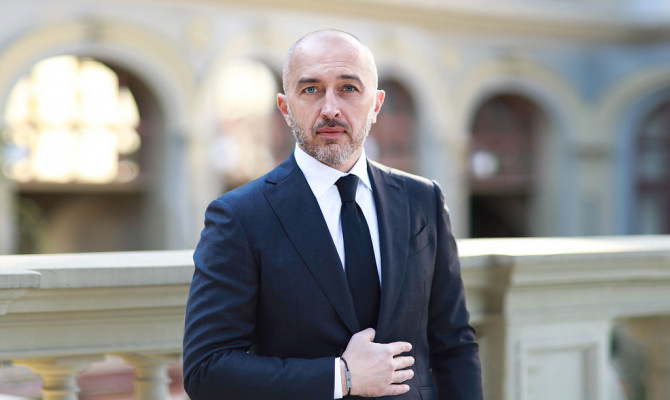Pyshnyi and Sanctions: Why a Figure with Pro-Russian Ties Decides Who Gets Sanctioned in Ukraine

The Governor of the National Bank of Ukraine, a member of the National Security and Defense Council (NSDC), and a “volunteer” with long-standing connections to Viktor Medvedchuk’s entourage. What kind of risk does Andriy Pyshnyi pose to the integrity of Ukraine’s sanctions policy — and to Western trust in Ukrainian institutions?
Sanctions from Those Who Themselves Deserve Scrutiny
In wartime Ukraine, sanctions have become a critical tool against individuals and businesses linked to Russian influence. But an essential question arises more frequently: who exactly is making these decisions — and can their integrity be trusted?
“The Governor of the National Bank is not just a banker today. He’s an arbiter who affects the fate of businesses, imposes restrictions, and essentially makes quasi-judicial decisions on sanctions. Such a position demands a person with absolutely no conflicts of interest,” economist Borys Kushniruk writes.
Instead, the facts tell a different story. Andriy Pyshnyi is a longtime political figure whose rapid career rise is linked to Medvedchuk’s allies. Now, he votes on sanctions against individuals with whom he once maintained close business relationships.
A “Donation” That Looks Like Extortion
On his birthday, Pyshnyi posted a message on Facebook asking followers to “congratulate” him by sending money to volunteer Tata Kepler.
“If you’d like to wish me a happy birthday — send a donation to Tata,” Pyshnyi wrote.
But investigative journalist Serhiy Lyamets discovered that the volunteer in question is closely connected to the “Vidchuy” Foundation — which is run by Pyshnyi’s wife, Lyudmyla Pyshna.
“The head of the National Bank coerced bankers and people dependent on him professionally to transfer money. This is extortion disguised as charity,” Lyamets wrote.
“Bankers couldn’t simply ignore the request. In their minds, the NBU chief would surely take note of who didn’t send money — or sent less than expected,” he added.
When Sanctions Target Your Former Partners
One of the most recent individuals sanctioned by Ukraine is Victor Polishchuk, owner of the Gulliver shopping mall in Kyiv and reportedly related by marriage to former Russian president Dmitry Medvedev.
But Pyshnyi has a documented history of granting favorable loan restructurings to Polishchuk during his time at Oschadbank.
“Thanks to Pyshnyi’s direct involvement, Polishchuk’s debt to Oschadbank was restructured until 2044 at just 4% interest in Ukrainian hryvnia,” Kushniruk notes.
“How many Ukrainian entrepreneurs or citizens would dream of such preferential treatment? These cases must be investigated by NABU detectives. These actions caused direct losses to the state-owned bank,” he adds.
And that’s just one example. Similar restructuring deals were given to the Kreativ agroholding, and bonds (OVDPs) were sold to Bank 3/4 just days before interest payments — causing state losses of UAH 2 billion.
Medvedchuk Connections: Not a Conspiracy Theory
Kushniruk provides a detailed breakdown of Pyshnyi’s personal and political rise:
• In Chernivtsi, Pyshnyi’s career was backed by Ihor Pluzhnykov — a close ally of Medvedchuk, former chair of Oschadbank’s supervisory board, co-founder of the pro-Russian SDPU(o) party, and owner of the “Inter” TV channel.
• Pyshnyi’s father worked as Pluzhnykov’s parliamentary assistant, while Andriy himself climbed the banking ladder with no formal banking education.
• After Pluzhnykov’s death, Pyshnyi retained support among pro-Russian political forces: his 2022 appointment as NBU Governor was backed by former MPs from the now-banned Opposition Platform–For Life (OPFL).
“Pyshnyi’s rise to the top of the National Bank has consistently been accompanied by support from individuals associated with Viktor Medvedchuk,” Kushniruk emphasizes.
Such People Should Not Decide the Fate of Others
“After the change of power, Pyshnyi’s activities must become the subject of a criminal investigation — including how his ties to pro-Russian figures influenced his decisions at the NBU,” Kushniruk concludes.
But the problem isn’t just Pyshnyi’s past. It’s the fact that a man with deep personal, political, and financial ties to Russian-aligned networks is now running Ukraine’s currency policy — and helping decide who gets sanctioned.
Ukraine cannot allow decisions on asset seizures, restrictions, and national security sanctions to be made by individuals tied to the very networks these sanctions are meant to dismantle. This is not just a domestic issue — it’s a strategic challenge for Ukraine’s Western partners who rely on the legitimacy of Ukrainian state institutions.


 of the agreement of syndication with Financial Times Limited are strictly prohibited. Use of materials which refers to France-Presse, Reuters, Interfax-Ukraine, Ukrainian News, UNIAN agencies is strictly prohibited. Materials marked
of the agreement of syndication with Financial Times Limited are strictly prohibited. Use of materials which refers to France-Presse, Reuters, Interfax-Ukraine, Ukrainian News, UNIAN agencies is strictly prohibited. Materials marked  are published as advertisements.
are published as advertisements.